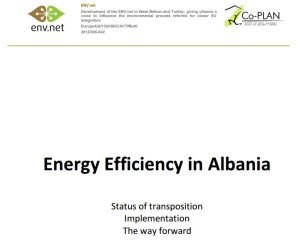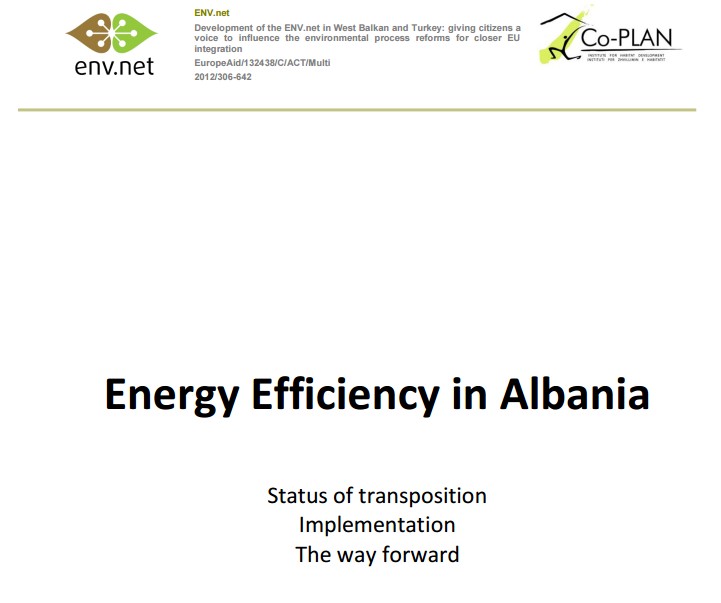Energy Efficiency in Albania 2013
 The process of European integration aims to bring peace and economic prosperity to Europe through the integration of markets and the presence of a safety net for citizens. Within the EU and its member-states, energy and environment are two of the most pressing issues of today. The prospect of sharply rising energy prices and increasing dependence on imports makes the EU energy supply less reliable, and jeopardizes the whole economy. Reducing emissions and curbing climate change are key objectives of the EU energy policy. Environmental policy is one of the most relevant examples of the progressive institutionalization of a system of government built around the original aim of economic integration. Today, indeed, many of the regulations in a Member State’s environmental legal framework are a direct or indirect emanation of the Acquis Communautaire. Candidate and potential candidate countries, when adapting national norms to EU standards, are faced with quite challenging institutional, financial and technical issues. A committed and long-term political agenda can transform these issues into a greater opportunity for development. The present report aims at describing the sub-sector of Energy Efficiency in Albania, as Potential Candidate country, its recent developments and its challenges. It presents the results of a desk study undertaken by the Consultant between May and July 2013 in Albania.
The process of European integration aims to bring peace and economic prosperity to Europe through the integration of markets and the presence of a safety net for citizens. Within the EU and its member-states, energy and environment are two of the most pressing issues of today. The prospect of sharply rising energy prices and increasing dependence on imports makes the EU energy supply less reliable, and jeopardizes the whole economy. Reducing emissions and curbing climate change are key objectives of the EU energy policy. Environmental policy is one of the most relevant examples of the progressive institutionalization of a system of government built around the original aim of economic integration. Today, indeed, many of the regulations in a Member State’s environmental legal framework are a direct or indirect emanation of the Acquis Communautaire. Candidate and potential candidate countries, when adapting national norms to EU standards, are faced with quite challenging institutional, financial and technical issues. A committed and long-term political agenda can transform these issues into a greater opportunity for development. The present report aims at describing the sub-sector of Energy Efficiency in Albania, as Potential Candidate country, its recent developments and its challenges. It presents the results of a desk study undertaken by the Consultant between May and July 2013 in Albania.
[embeddoc url=”https://info.aea-al.org/wp-content/uploads/2015/07/CoPlan_Energy-Efficiency_Report-RZajmi_July-2013.pdf” viewer=”google”]

